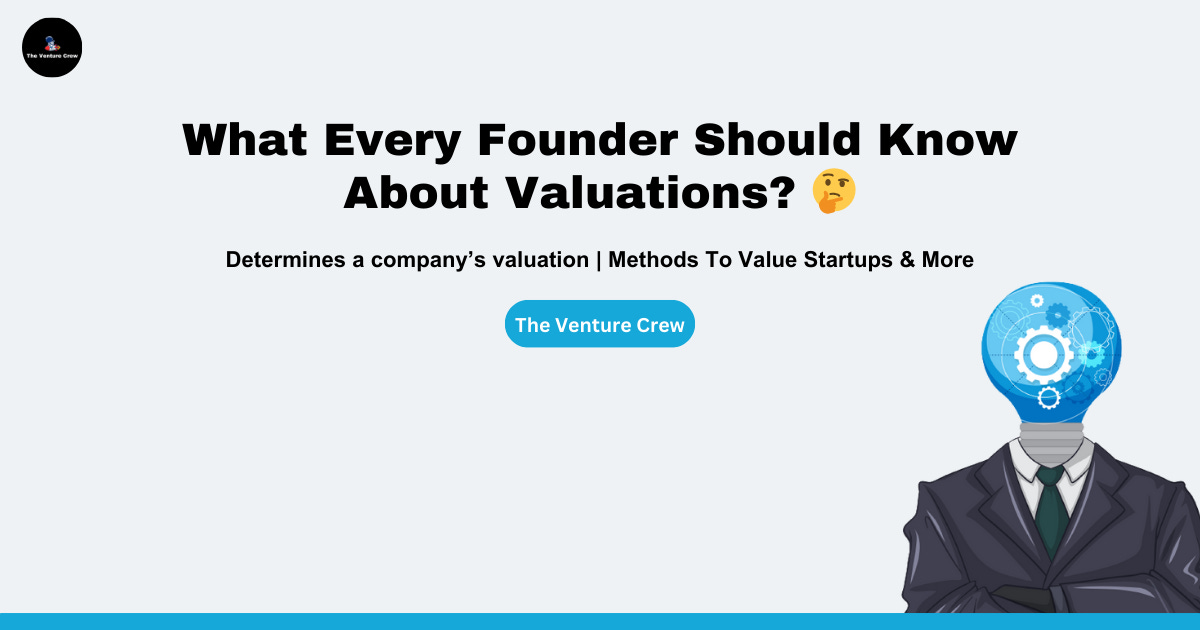What Every Founder Should Know About Valuations? | Is The VC Investment Model Broken? | VC Remote Jobs and More
Things To Know About Startup Valuation | VC Investment Model Broken | VC Remote Jobs
📢 Today At A Glance
Focus On: What Every Early-Stage Founder Should Know About Valuations?
Featured Article: Is The VC Investment Model Broken?
Major News In Startups: OpenAI and Jony Ive in talks to raise $1bn, Increasing regulations in AI Startup Investing and More
This Week’s Must Reading on Startups, Venture Capital & Technology
Venture Capital Remote Jobs & Internships: From Scout to Partner
🤝Today’s Tool Spotlight: Wave AI
I've got to tell you about something amazing I've discovered – Wave. It's a fresh take on professional growth, making it super fun, measurable, and effortless.
Wave's approach revolves around building daily routines and tackling workplace challenges like leadership and time management head-on. What's even more impressive? Bigwigs from Amazon, Stripe, Google, and Strapi are already using it to enhance their skills.
Trust me, this is the innovative solution we've all been waiting for. Give Wave a shot – you won't regret it! 🔥
📢 What Every Early-Stage Founder Should Know About Valuations?
I get a lot of questions regarding valuation from founders who are looking to fundraise for the first time. So, for this post I thought to share some key note on those questions. Let deep dive into it:
What determines a company’s valuation?
In its most basic sense, valuation can be calculated by multiplying the shares outstanding by the price per share. The thing is that company valuation is more of an art than a science due to the mix of qualitative and quantitative factors that go into it.
Value of company = Shares outstanding * Price per Share
Below I share some of the factors that Brad Feld shares in Venture Deals followed by my opinion on each:
Stage of the company:
Early-stage valuation is impacted by factors such as entrepreneur experience, the perception of overall opportunity, and the amount being raised.
Later-stage valuation heavily relies on financial performance and projections.
Funding competition: there is a positive correlation between the number of investors who want to fund a company and the valuation of such a company.
Leadership team experience: because there’s a perceived negative correlation between more experienced entrepreneurs and risk, the valuations of companies with more experienced leadership teams will be higher. Note: personal biases will play a role here.
Size and trendiness of the market: Your market size (e.g., TAM, SAM, SOM) and the growing demand of a company’s market will also have a positive correlation with valuation.
An investor’s entry point: Some investors have a valuation investment range. For example, an investor might only invest in companies that are valued at $10M or less.
Financials and other numbers: There is a direct correlation between how well a company’s financials and numbers stack up (against its given industry and competitor benchmarks) with the company’s valuation.
Economic climate: There is a tentative positive correlation between the stock market’s performance and the valuation of a company. That’s to say that if the stock market is performing well, valuations will be higher and vice versa.
Basically, if many investors perceive a given company to be less of a risk and more of an investment opportunity (aka shows signs of a successful exit) — due to its strong leadership, market size/trendiness, and numbers — the valuation of a company is likely to be higher than lower. It makes sense, no?
Remember, investors want to invest on the horse that’s most likely to win the race.
What are some methods that investors use to value companies?
Investors may calculate valuation by assessing:
Comparables: the valuation of other companies with a similar profile
Multipliers: industry revenue/EBITDA/EBIT multipliers
Formulas, such as pre-money valuation = ($1M x #Engineers) — ($1M x #MBAs) AND Net Present Value (discounted cash flows)
Venture Capital/Leveraged Buyout Method
Monte Carlo Simulations
We have covered some of the methods in our previous newsletter writeups. Check out in our home page.
The most common question that I received from every founder,
Is it mandatory to calculate a company’s value to fundraise?
Valuation in fundraising has several benefits. At a basic level, founders will know exactly how much of the company they’ve sold and they’ll also have a cleaner cap table. Valuation will also make life easier for everyone involved — investors and founders.
That said, companies don’t need to value their companies in order to fundraise, at the start. There are multiple fundraising vehicles that allow for a postponed valuation to take place in a future and larger fundraising. Such mentioned vehicles include, but are not limited to, the:
Convertible Note — Investors give companies money in exchange for an opportunity to buy the stock at a discount in a future financing round. Until then, the “investment” is considered debt that pays interest. If you want to know more about it, check out our previous article.
SAFE (Simple Agreement for Future Equity) by Y Combinator. A SAFE is neither debt nor equity and has no maturity date or accruing interest. You can also check about this in our home page.
Should companies aim for the highest valuation they should get?
No. Because a too-good-to-be-true kind of deal is likely to hurt everyone involved in the next round. If you have a high valuation in one round, then fail to hit the right milestones and end up having to raise at a lower valuation, that’s going to dilute your original shareholders. If that happens, it’s possible that they block a new financing. No founder wants that — it’s already hard to run a company and fundraise.
Also, if a company raises at higher valuations, the company’s investors will expect a bigger exit and will block a sale if they are not happy with the selling price.
I hope this helps you to get an idea of what’s an important thing to know during valuing your company. Have any questions, comment down!
Join 5900+ Founders, VCs and startup Enthusiasts Getting Tactical To Build, Learn and Implement Startups, Technology and Venture Capital.
📢 Featured Article: Instacart: Is The VC Investment Model Broken?
Recently I came across an interesting article on “Is the VC investment model broken?” by Gavin McManus. So, sharing some of the key points from the article.
Resource: Medium (Article)
The past 18 months have presented a significant challenge for private investors and dealmakers due to the Federal Reserve's decision to raise interest rates from 0.25% to 5.5%. This move, aimed at managing high inflation and limiting unemployment, has had a substantial impact on the venture capital (VC) and private equity (PE) sectors. Higher interest rates have made debt more expensive, financing deals more difficult, and fundraising more challenging, leading to a slowdown in VC/PE deal flow and private market activity.
A notable consequence of this monetary policy has been the impact on high-growth startups and the unrealized gains and losses experienced by leading VC firms. Recent IPOs, including Instacart, highlighted the struggles faced by investors, with late-stage investments often resulting in losses. This situation has raised questions about the sustainability and effectiveness of the VC business model.
Resource: Medium (Article)
Upon analyzing several significant IPOs over the last 5–10 years, it became apparent that VC investments, particularly beyond Series-C/D rounds, rarely yield worthwhile returns. Exceptions like Airbnb, buoyed by its profitability, underscored the importance of a company's financial health. Software and SaaS companies were especially vulnerable to unrealized losses in later rounds, emphasizing the challenges faced by tech-focused VC investments.
Comparisons with S&P 500 returns highlighted that broad investments in the stock market consistently outperformed late-stage VC investments. It became evident that unless VC firms opted to sell all holdings at the IPO or waited several years, late-stage investments were likely to underperform.
Also the increasing importance of profitability for organizations seeking funding. While the business's underlying value and its price didn't have to be aligned, profitability appeared to provide VC investors with more substantial returns, even if it took longer to meet benchmarks.
In summary, the VC investment model had been largely ineffective, prompting the industry to realign with underlying businesses. This shift, while challenging, could ultimately be positive, requiring companies to focus on positive growth objectives, rational business initiatives, and solid financial fundamentals.
If you want to read the full article - here is the link.
📰 Major News: VC Highlights & Massive Funding Updates
8 Proven Strategies To Beat The ~80% VC-Venture Failure Rate Read Here
OpenAI and Jony Ive in talks to raise $1bn from SoftBank for AI device venture Read Here
VC firms working with D.C. to "self-regulate" AI startup investing Read Here
Former Tinder CEO’s startup to fight loneliness with AI chatbot gets backing by Sequoia Read Here
Increasing Legal Obstacles In Venture Capital Funding Read Here
Subscribed To - VC Daily Digest Newsletter and join 2500+ Avid Readers For Daily Morning Venture Insights, Funding Updates And Startup Stories In Your Inbox. 🚀
🗞️ This Week’s Must Read On: Startup, Technology & VC
Startups Fail All The Time, But Many Could Fail Better By Thinking Beyond the VCs and Founders Read Here (Startup)
Hidden Clauses In The Term Sheet that Every Founder Should Know Read More (Startup & Venture Capital)
What I have learned from users By Paul Graham? Read More (Startups)
Why It's Better To Raise Less Capital In The First Round? Read More (Startups)
Does an AI Premium Exist in the Fundraising Market? Read More (Technology)
The Future of Silicon Valley Read More (Venture Capital )
Why Do VC Firms Want an Option Pool Before the VC Round? Read More (Startup)
💼 Venture Capital Remote Jobs & Internships
3VC - Associate | Remote - Apply here
3VC - Analyst | Remote - Apply here
Generator - program manager | Remote - Apply here
Pulsar VC - VC Fellow | Remote - Apply Here
Vorverk Venture - Analyst Internship | Remote - Apply Here
Harlem Capital - Winter 2024 Internship | Remote - Apply Here
Initialized Capital - VC Partner | Remote - Apply here
Summer Associate - Early Bird Venture | Remote - Apply here
Join our VC Enthusiast Community - VC Crafters - A Community For VC Enthusiasts To Learn, Collaborate, Network and Craft Path To VC.
🙀 Get access to VC Career Resources - Curated By Leading Venture Capitalists! Get It Yours - here
📦 Share VC’s Newsletter
Refer a friend to gain access to our venture resources. 🎊
Get Venture Resource Database. for 10 referrals
Get Access To private Slack for 15 referrals
Get On a 30-minute call for 25 referrals ( To Discuss fundraising, breaking into VC funds, making a pitch deck, building a newsletter and others)
✍️Written By Sahil | The Venture Crew Team










